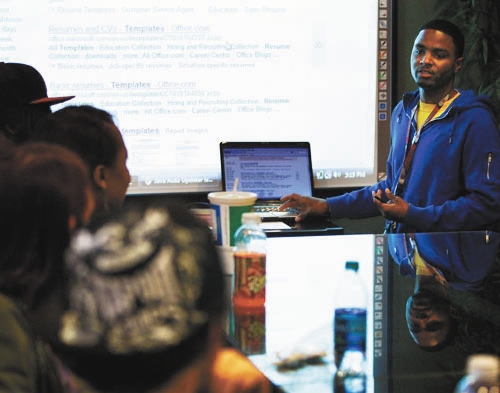Upheaval in homeless teens program brings threat of funding loss
EDITOR'S NOTE: Some last names were withheld from this report because of the sensitive nature of the young people's stories.
As an 8-year-old, Katarina was beaten, bruised and choked by adults she was supposed to be able to trust.
The men in her life at the time slammed her frail 90-pound frame against walls, grabbed her by the neck, whipped her with belts, threatened her with baseball bats and smacked her around.
The daily physical abuse at the hands of her father and stepfather -- a man she calls her "mom's husband" -- would go on for a decade.
She tried to run away, many times. The very first time she plotted to escape the violence, she was hit by a commercial truck that shattered her tiny body. Her mother left her at the hospital. When she was released from the hospital, her father continued the beatings and would not give her pain medication, even though she wore two arm casts from fingertips to shoulders and a back brace. She was 12.
Katarina, now 18, recounts her life story at the William Fry Drop-In Center, a resource provided by the Nevada Partnership for Homeless Youth, which offers kids 12 to 18 living on the street access to food, clothes, showers, health care, counseling, tutors and an independent-living program. After sleeping in cars and parks, going for months at a time without bathing and being forced to wash up in fast-food restaurant restrooms, Katarina needed the help.
"I've been through hell, and this place is like heaven," said Katarina, who has been getting help from the charity for a few months. "There's a positive side to the darkness I've been seeing for years."
She is one of the many faces caught in the middle as the embattled nonprofit distances itself from co-founder and former Executive Director Kathleen Vermillion, who resigned amid allegations that she misused the charity's money.
And now, the nonprofit risks losing about half of its county funds to a proposed summer swim program for low-income families in a move charity workers say is punishment for the alleged actions of previous leadership. The County Commission is slated to discuss the issue today.
THE THROWAWAY KIDS
A handful of teenagers lounge around the drop-in center in a 1,991-square-foot home near the University of Nevada, Las Vegas. Some sprawl out on bean bag chairs watching celebrity chefs Rachael Ray and Paula Deen cook on television. Others update their social media websites, chat with friends, send emails and do homework. Some wait to see their case managers.
It's one giant family.
Jennifer Lopardo, a case manager and assistant programs manager at the center, hugs a client and asks her about her day. She and the other charity workers consider themselves "surrogate parents because if we don't care, who will?" Lopardo said.
That includes hospital visits for "the throwaway kids," getting them jobs and bus passes, picking them up from appointments and helping them get birth certificates and other identification.
The partnership estimates that 300 kids 18 or younger sleep on Las Vegas' streets nightly. At least 3,000 homeless youth throughout the city live on the streets, couch surf or stay in shelters.
Right now, 318 kids are taking advantage of the resources.
Bob Bellis, assistant programs manager, asks one teen in a fatherly tone about why he isn't picking up his phone. He has an excuse, but it isn't good enough for Bellis.
"When these kids come here, they're guarded and desperate," Bellis said. "We help them build trust again."
Should the charity lose $100,000 of its $214,000 county grant money, staffing and services provided would suffer greatly, Lopardo said.
"These are kids on the cusp of life and death," she said, choking back tears.
Vincent Pollard is the group's outreach coordinator charged with the responsibility of making sure everyone knows about the program. Having been a homeless teenager himself without the resources now provided by the drop-in center, Pollard is taking the county swim program proposal personally.
"This is about recreation versus saving a life," he said. "There's no comparison."
County Commissioner Chris Giunchigliani, who sponsored the proposal along with Commissioner Lawrence Weekly, denied her intentions were retaliation and said she does not want to terminate the agreement with the nonprofit as it undergoes leadership change. She simply sees a way to stretch the dollars so that more good can come from them.
She asked the head of the charity's board to review the grant request because the "budget submitted was identical to the budget they presented the year before -- no new goals, no documentation of whether the goals had been met, same number of youth."
A county audit performed in January found that funding provided by the county to the nonprofit was "not subject to financial mismanagement" under Vermillion's leadership, according to Sabra Smith Newby, county director of administrative services.
Smith Newby said the audit focuses on reviewing county funds, not funds provided by other community partners or private donors.
The charity also has hired its own forensic auditor -- the audit might take up to six weeks -- and the nonprofit is conducting an internal audit. The results of those audits will be made public.
WATCHING THE NEWS
Lopardo said some kids have read the newspapers and watched the TV broadcasts about the partnership's struggles with Vermillion and the county. But they are reassured the charity is performing well and they have nothing to worry about, she added.
"At the end of the day, not a lot of kids knew (Vermillion) because she was never here," Lopardo said.
Commissioners received a letter last week from a local church group pleading to keep investing resources into the nonprofit. The church group raised about $5,000 for the charity around Christmas.
"These young people are some of the most at risk in our society," the letter read. "Many are in these dire straits because of economic challenges beyond their control. What has happened is no fault of theirs! We respectfully question why they should be deprived."
Earlier this month, Arash Ghafoori, executive director, sent out a letter on behalf of the charity's board addressing the concerns of donors and other supporters.
"... (We) are working vigilantly to ensure that any and all issues raised are thoroughly examined and corrected, that every dollar of our donors' money is properly and judiciously spent, and that the agency remains a healthy, transparent, and high-quality provider of vital services to Southern Nevada's most vulnerable population," the letter read.
Ghafoori filed a complaint with the Nevada attorney general earlier this year, alleging Vermillion had misappropriated charity funds. The FBI has joined the attorney general's investigation.
Neither department will confirm or deny such an investigation exists, per each department's policy.
The nonprofit's story grew more complicated as Vermillion waged a very public legal battle with one of the charity's largest donors, her ex-boyfriend, Commissioner Steve Sisolak. Vermillion has since dropped a lawsuit claiming Sisolak engaged in an inappropriate relationship with her 15-year-old daughter and released results of a failed drug test requested by the charity to county employees.
Sisolak filed a report with the Metropolitan Police Department accusing Vermillion and her former legal team of criminal extortion. Police are still investigating.
ON THE STREETS
Katarina, a freshman in the College of Southern Nevada's nursing program, beams when she talks about overcoming the hardships she has endured in her short life and the help she has received from the charity.
"This is a lot of help here," Katarina said. "This is about our lives. I don't worry about wanting food. There's nothing like that feeling of being able to sleep and know no one will put their hands on you."
Her best friend is Carmella. Both teens came to the drop-in center on the same November day. They have a special handshake and share a similar sense of humor. Carmella, 18, tells a story just as tragic as her best friend's.
The physical abuse began when she was 14. That was when her father lost his job after having a seizure at work. He was let go for being a danger to himself and others, Carmella said.
"He threw me into the stairwell and threw me into a sink," she said. "My brother got it worse."
She left the day her father hit her on the foot with a medal pole while she was sitting at the family computer.
"It went 'pop!' " Carmella said, describing the sound of the pole smacking her foot's flesh and bone. It turned purple and began to swell.
She packed up her belongings and hobbled the four miles to her grandmother's, who wouldn't accept her because of "family drama." So she went to her then-boyfriend's house to stay a day before his parents kicked her out. She went to a gas station that gave her the number for the drop-in center. It was the same place her brother had gone to for help.
She began walking to the meet-up spot to get a ride to the center, but her bag of clothes ripped, sending them into the street. She picked them up, her foot still throbbing from the pain, placed them in a grocery cart and met up with her ride, an outreach coordinator from the center.
"If this place wasn't here, I'd probably be on the street," Carmella said, her voice trembling.
"Me and that basket. I'd probably have to live in it. I really thought it was over for me. That's it. I'm a bum on the streets."
Carmella now works as a ride attendant for one of the Strip casinos.
"They did so much for me, and I want to tell everyone I came from the streets to Safeplace," Carmella said. "I think every state needs this for every child."
MICKEY AND GOOFY
Marquis Richardson, 20, and Levon Moses, 19, met in Rochester, N.Y. Both were homeless teenagers trying to leave the gang life. They robbed and fought to survive. They didn't want to do it anymore.
Richardson was known in his gang as "Mickey." Moses was known in another gang as "Goofy." It seemed as if fate sealed their best friendship. They room together in the charity's independent- living program.
"I got shot at and didn't want to end up dead like my friends," Moses said.
He worked odd jobs posted on the Internet and "slept where I could." He had been homeless since he was 12. The low point was when he slept on a park bench in the dead of winter.
After bouncing around shelters throughout the country, Moses ended up in Las Vegas. He found the drop-in center on the Internet and got Richardson to move, too.
Richardson, an aspiring music producer, is working as a security guard, a job he found through the charity.
"They play mom and dad on us about doing what we got to do," Richardson said of the caseworkers. "It's impacted our lives 100 percent. They gave us an opportunity to become better, and it helped me grow into a man."
If it wasn't for the drop-in center, Moses wouldn't have found a tutor to help him in the CSN nursing program. He is studying to take his boards soon to become a certified nurse.
"It's your motivation and determination and drive," Moses said. "No matter what's in your way, no matter what obstacles you have to overcome, you're going to do it regardless."
Contact reporter Kristi Jourdan at kjourdan@reviewjournal.com or 702-455-4519.































